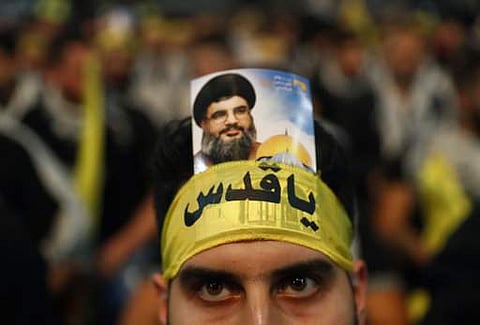

The Israeli military on Friday assassinated Hassan Nasrallah, the long time chief of Hezbollah, the Lebanese political party and paramilitary force, which is "one of the most powerful non-state armed organisations in the world."
He was assassinated by the Israeli military by carrying out multiple airstrikes on residential buildings in the southern suburb of Beirut known as Dahiyeh. According to the Israeli military, 85 tonnes of explosives were dropped on the densely populated neighbourhood with each bomb weighing one tonne. The airstrikes, flattened six buildings killing several people including children. According to media reports, the death toll is likely to go up as rescue operations to pull out people trapped under the rubble of the buildings are underway.
The attack, the biggest blast to hit the Lebanese capital in the past year took place while Israel Prime Minister Benjamin Netanyahu was at the UN headquarters in New York.
"Nasrallah was one of the greatest enemies of the state of Israel of all time... His elimination makes the world a safer place," Israeli military spokesman Rear Admiral Daniel Hagari said at a televised briefing after announcing his killing.
Who is Hassan Nasrallah?
Born in 1960 into a poor Shia family in East Beirut, Nasrallah and his family were forced to shift to their ancestral home in the south Lebanon village of Bazzouriyeh during the Lebanese civil war in 1975.
Nasrallah joined the 'Amal' movement, a political and paramilitary organisation representing the Shia community in Lebanon at the age of 15. After completing his education, Nasrallah taught at the school run by 'Amal' leader Sheikh Abbas al-Musawi’ who later founded the umbrella organisation called Hezbollah.
Hezbollah was founded in 1985 to resist the Israel invasion of Lebanon in 1982. Hezbollah is funded by Iran.
"When we entered Lebanon, there was no Hezbollah. We were accepted by perfumed rice and flowers by the Shi’a in the south. It was our presence there that created Hezbollah,” former Israel PM Ehud Barak once noted.
In 1992, the Israeli military assassinated al-Musawi along with his wife and three children.
Nasrallah then took over the leadership of the movement, after which it flourished and went on to become the largest political party in Lebanon’s recent history.
In October 2021, Nasrallah said that Hezbollah had 100,000 fighters, making it among the most powerful non-state armed organisations in the world.
Why is Nasrallah considered the biggest enemy of Israel?
Under Nasrallah, Hezbollah became a major and powerful opponent of Israel in Lebanon. It succeeded in forcing the Israeli army out of the Lebanon territory in 2000, ending an 18-year-long occupation which began in 1982. Nasrallah’s eldest son, Hadi, was killed in 1997, fighting against Israeli forces.
After the Israeli withdrawal, Nasrallah also led a complex exchange of prisoners with Israel, resulting in hundreds of Palestinian and Hezbollah members being freed and bodies of fighters returned to Lebanon.
Soon after Israel began its war on Gaza, Hezbollah began attacking Israeli military posts along the border calling it a “backup front” for Gaza.
In speeches throughout the conflict, Nasrallah has argued that Hezbollah’s cross-border strikes had pulled away Israeli forces that would otherwise be focused on Hamas in Gaza and insisted that Hezbollah would not halt its attacks on Israel until a cease-fire is reached in Gaza.
Nasrallah has maintained a defiant tone, even as tensions rose dramatically in recent weeks with Israel announcing a new phase in the conflict intended to push Hezbollah back from the border.
"We don't want to kill anyone or treat anyone unjustly... we want justice to be restored. And the only solution is the establishment of a state on the land of Palestine where Muslims, Jews and Christians can live in peace in a democratic state," Nasrallah had said explaining his organisation's vision for ending the Israel-Palestine conflict.
"Any other solution would simply not be viable and wouldn't be sustained," he added.